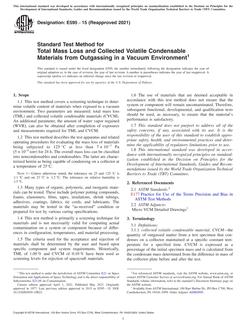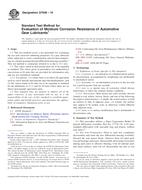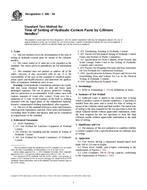1.1 These test methods cover the testing of heat-shrinkable tubing used for electrical insulation. Materials used include poly(vinyl chloride), polyolefins, fluorocarbon polymers, silicone rubber, and other plastic or elastomeric compounds.
1.2 The values stated in inch-pound units are to be regarded as standard, except for temperature, which shall be expressed in degrees Celsius. The values given in parentheses are mathematical conversions to SI units that are provided for information only and are not considered standard.
1.3 The procedures appear in the following sections:
| Procedure | Sections | ASTM Method Reference |
| Adhesive Peel Strength | 98-104 | |
| Brittleness Temperature | 40 | D746 |
| Color | 55 and 56 | D1535 |
| Color Stability | 57-62 | D1535 |
| Conditioning | 7 | D618 |
| Copper Stability | 93 | |
| Corrosion Testing | 89-95 | |
| Dielectric Breakdown | 20-25 | D149 |
| Dimensions | 8-13 | D876 |
| Flammability | 68-72 | D876 |
| Fluid Resistance | 63-67 | |
| Fungus Resistance | 104-108 | |
| Heat Resistance | 49-54 | |
| Heat Shock | 26-30 | |
| Low-Temperature Properties | 36-43 | |
| Restricted Shrinkage | 14-19 | |
| Selection of Test Specimens | 6 | |
| Secant Modulus | 81-84 | D882 |
| Storage Life | 31-35 | |
| Specific Gravity | 73 and 74 | D792 |
| Stress Modulus | 85-88 | D412 |
| Tensile Strength and Ultimate Elongation | 44-48 | D412 |
| Thermal Endurance | 96 and 97 | |
| Volume Resistivity | 75-78 | D257 |
| Water Absorption | 79 and 80 | D570 |
| Melting Point | 104-108 | D3418 |
1.4 This is a fire-test-response standard.
1.5 This standard does not purport to address all of the safety concerns, if any, associated with its use. It is the responsibility of the user of this standard to establish appropriate safety and health practices and determine the applicability of regulatory limitations prior to use. For specific hazard statements, see Sections 5 and 68.2.
Note 1 – These test methods are similar, but not identical to, those in IEC 60684–2 (see also Note 9).
68.1 This is a fire-test-response standard. The test procedures measure the resistance of the tubing to ignition and propagation of flame after ignition under prescribed conditions of test.
68.2 This standard is used to measure and describe the response of materials, products, or assemblies to heat and flame under controlled conditions, but does not by itself incorporate all factors required for fire hazard or fire risk assessment of the materials, products, or assemblies under actual fire conditions.
68.3 Fire testing is inherently dangerous. Adequate safeguards for personnel and property shall be employed in conducting these tests.
Product Details
- Published:
- 10/01/2009
- Number of Pages:
- 19
- File Size:
- 1 file , 240 KB
- Redline File Size:
- 2 files , 410 KB


